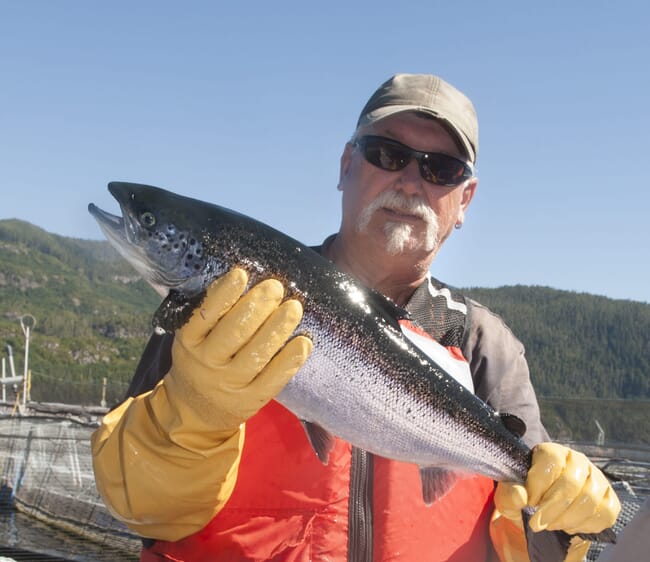
© BCSFA
So concludes an independent economic analysis released today, by RIAS Inc, which has prompted BC’s salmon farming community to call on the federal government to set aside its decision to force the closure of farms in the Discovery Islands area and engage in “a more responsible path forward for British Columbia’s coastal communities”.
BC salmon farmers are calling for more time, to give everyone with a stake in salmon farming time to develop a plan to minimize the serious impacts of this decision. They have also asked the government to allow them to transfer fish already in their systems to the farms to complete their lifecycle, in order to prevent the destruction of millions of juvenile salmon already in hatcheries and other facilities. And they are asking the government to bring all parties together in an inclusive and transparent process to find a better way forward and create unity in communities.
On 17 December, Fisheries Minister Bernadette Jordan ordered all salmon farms in the Discovery Islands to be removed by 30 June 2022 and that those farms cannot be re-stocked starting immediately. The BC Salmon Farmers Association (BCSFA) commissioned RIAS Inc, an independent economics firm, to investigate and report on the impact the decision would have.
“Reading this report when it arrived was heart-wrenching,” said BCSFA executive director John Paul Fraser. “We have been speaking about the impacts of this rushed, ill-considered decision since the day it was made, but this report really captured just how widespread the human and animal welfare impacts will be. Thankfully, we are also able to offer a reasonable, respectful way forward, one consistent with genuine reconciliation with First Nations and real engagement with all parties. The ball is now in the government’s court, and we ask them to seriously, and urgently, consider this reasonable way forward.”
Report author, Doug Blair, added that in his research he found significant concern with the lack of consultation by the Minister, leading her to make a rushed decision without understanding the implications and seemingly no plan to manage impacts.
“With only cursory consultation with affected parties, it is unclear how the true impacts of this decision were considered as part of the government’s decision-making process,” Blair said. “The only way to avoid the severe damages shown in our report would be for the government to revisit this decision and engage in a genuine process of consultation with all parties aimed at finding a better way forward. As it is, left unchanged this decision will be devastating.”
A reconsideration of the approach would have to happen immediately to be effective. Salmon farmers operate in five-year cycles, with animals that live three or four years before maturity, running from broodstock management through to fallowing farms after harvest. Several of the impacted farms were fallow when the decision came down and the majority were scheduled for stocking early in 2021.
The current decision that the farms are not to be re-stocked and must be out of the water in 18 months has forced salmon farmers into a position where they need to euthanise millions of juveniles in freshwater hatcheries, smolt in saltwater nursery sites, and young fish in saltwater grow-out sites, designated for farms in the Discovery Islands region. With so many farms being shuttered, there is not sufficient capacity at other farm locations to accommodate all of these animals.
Companies will likely have to start destroying fish and laying off workers within weeks.
Other concerns of closing down the Discovery Islands sites, as flagged up in the report, include removing almost $200 million in annual revenue from salmon farming and processing, along with the associated salaries, taxes, and community benefits; costing the BC economy almost $390 million in annual economic output, with an estimated $87 million less in annual salaries and benefits and $21 million less in annual tax revenue at the local, provincial, and federal levels.
Blair added his analysis is likely conservative, and the actual impact will be more significant.
“In compiling this report we did our best to quantify the expected immediate impacts of this decision,” said Blair. “In reality, the impacts likely will be far greater. That’s because we cannot account for the ripple effects from hundreds of families being forced to relocate elsewhere for work, selling their homes and leaving a hole in the community, or that the decision will likely push some suppliers over the brink into failure.”
The full report can be found http://bcsalmonfarmers.ca/discoverydamage/#



